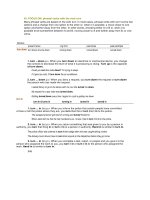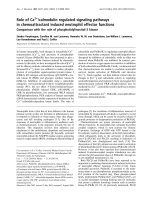hodder & stoughton - days with the great composers - vol.3 (mozart, schumann, tchaikovsky)
Bạn đang xem bản rút gọn của tài liệu. Xem và tải ngay bản đầy đủ của tài liệu tại đây (14.83 MB, 170 trang )
THE
STATUE
SUMMONS DON
GIOVANNI.
Thou bad'st me to
thy
supper,
I
would
return
the
courtesy:
Come answer
me,
come answer
me,
wilt thou too
Banquet
with
me
now ?
(Don
Giovanni).DAYS
WITH THE
GREAT
COMPOSERS
MOZART
SCHUMANN
TSCHA1KOVSKY
HODDER &
STOUGHTON
*
DAY
WITH
MOZAKT.
N
a dull
November
morning
in
the
year
1791,
a small
insigni-
ficant-looking
man,
about
thirty-
five
years
of
age,
arose
from
a
sleep
of
utter
exhaustion
;
for
he had
been
working
late into
the
previous
night.
It
was
about nine
a.m.
;
his
wife
Gonstanze had
long
been
up
and
employed
in
the
duties
of that
small,
poverty-stricken
household,
man, wife,
and two
small children
and their
little
home in
an
unimportant
street
of
Vienna. These
duties,
to
Constanze,
were
not
the
easiest of tasks
: for she
was but a
poor
domestic
manager,
and an
inefficient,
though
devoted,
mother and
wife.
As the
slight,
undersized
man
moved
to and
fro,
dressing,
with
rapid,
graceful gestures,
paying
a
great
deal of attention to the
powder-
ing
and
peruking
of his
profuse
brown
hair,
and
decking
out his
person
with
nearly
all the
scanty
2051153
A DAY
WITH
MOZART.
ornaments
he
possessed,
there
was
nothing
in
Wolfgang
Amadeus Mozart
outwardly
to
denote
that
amazing genius
which
made
its
dwelling
in
his
slender
frame.
A
dull fire
smouldered in
his
languid,
absent-minded
eyes
: but it was the
fire of
incipient
fever.
A
slight
flush
tinged
his
usually
pale
cheeks : but it was a hectic and
unhealthy
flush. A certain child-like
simplicity
still
remained as
though
he
were a case of
"arrested
development"
in his
features,
ex-
pression
and
deportment.
The
boy
whose
fame
began
at
four
years
old
had never
yet
really
quite
grown
up.
He had now discontinued
his
one-time
practice
of
taking
a
ride,
by
medical
advice,
first
thing
in
the
morning.
A
species
of
curious
nervousness,
induced
by
the
rapid
deterioration
of his
strength,
rendered
him
unequal
to horse-
exercise and his
attenuated
purse
hardly
allowed of
it.
For
this
man's life
was
a
continual
sheer
fight
for
existence,
a
fight
with fate and
circumstances.
It has
been said
that,
"all
the
music
created,
since
Guido
d*
Arezzo,
who
invented
musical
notation,
to
the
end of the
eighteenth century,
had
only
one aim
and
object
A
DAY
WITH
MOZART.
to create
Mozart,"
"the
greatest
composer
of
whom
I
have ever
heard,"
avowed his
contem-
porary
Haydn.
But
he was
by
no
means
a
prophet
in his own
country.
His
honorary
appointment
as Court conductor
only
brought
him
in
80
a
year.
And the
master-musician
who
at
twelve
had been
the
wonder
of
Europe,
a
prodigy,
a
Kleiner Hexenmeister
(little
magician),
was now
eking
out his difficult
days
in an
atmosphere
of anxious
penury,
unrecognised,
unacknowledged,
over-worked,
his
vitality
al-
most
expended.
For a few
minutes the
composer
knelt in
prayer
: the
despondency
which was
gradually
enshrouding
him fell
off for a
while,
revealing
rifts of
heavenly
sunshine
to his
troubled mind.
Again
he
reflected,
in the words he had written
as
a
youth
:
"I
have God
always
before
my
eyes,
I
acknowledge
His
omnipotence.
I fear
His
wrath,
but I also
acknowledge
His
love,
His
pity
and His
mercy
towards His
creatures.
Whatsoever
is
according
to
His
will,
is
also
according
to mine
:
therefore
I
cannot fail to
be
happy
and
contented."
And he rose from
his
knees refreshed.
A DAY
WITH
MOZART.
ornaments he
possessed,
there was
nothing
in
Wolfgang
Amadeus
Mozart
outwardly
to
denote
that
amazing
genius
which
made
its
dwelling
in
his
slender
frame.
A
dull
fire
smouldered
in
his
languid,
absent-minded
eyes
: but
it was the
fire
of
incipient
fever.
A
slight
flush
tinged
his
usually
pale
cheeks
: but it
was a
hectic and
unhealthy
flush. A
certain
child-like
simplicity
still
remained as
though
he were a
case
of
"arrested
development"
in his
features,
ex-
pression
and
deportment.
The
boy
whose
fame
began
at
four
years
old
had
never
yet
really
quite grown
up.
He had
now
discontinued his one-time
practice
of
taking
a
ride,
by
medical
advice,
first
thing
in
the
morning.
A
species
of
curious
nervousness,
induced
by
the
rapid
deterioration
of
his
strength,
rendered him
unequal
to horse-
exercise and
his
attenuated
purse
hardly
allowed of
it.
For
this man's life was
a continual
sheer
fight
for
existence,
a
fight
with
fate and
circumstances. It has been said
that,
"all
the
music
created,
since
Guido
d
j
Arezzo,
who
invented musical
notation,
to the
end
of
the
eighteenth
century,
had
only
one aim and
object
A DAY
WITH
MOZART.
to create
Mozart,"
"the
greatest
composer
of
whom I
have
ever
heard,"
avowed his
contem-
porary Haydn.
But he
was
by
no
means a
prophet
in his own
country.
His
honorary
appointment
as Court
conductor
only
brought
him
in
80
a
year.
And the
master-musician
who at
twelve
had been
the wonder
of
Europe,
a
prodigy,
a
Kleiner Hexenmeister
(little
magician),
was now
eking
out his
difficult
days
in an
atmosphere
of
anxious
penury,
unrecognised,
unacknowledged,
over-worked,
his
vitality
al-
most
expended.
For a few
minutes the
composer
knelt in
prayer
:
the
despondency
which was
gradually
enshrouding
him fell off
for a
while,
revealing
rifts of
heavenly
sunshine
to
his troubled mind.
Again
he
reflected,
in the words he had
written
as
a
youth
:
"I
have God
always
before
my
eyes,
I
acknowledge
His
omnipotence.
I fear
His
wrath,
but I also
acknowledge
His
love,
His
pity
and His
mercy
towards
His creatures.
Whatsoever
is
according
to His
will,
is
also
according
to
mine
:
therefore
I cannot fail
to
be
happy
and
contented."
And
he rose from
his
knees
refreshed.
A
DAY WITH
MOZART.
He went
into
the little
living-room,
and,
without
waiting
for the somewhat
unattractive
breakfast
which
Gonstanze was
preparing,
he
set to
work
upon
a
manuscript
in
his
small
neat
handwriting.
He wrote
standing
up,
for
health's
sake :
any
cramped
attitude
was
repugnant
to
his flexible and
freedom-loving
limbs.
But,
indeed,
he could write in
any
position,
or under
any
circumstances.
"I
am,
so to
speak,
so swallowed
up
in
music,"
he
averred,
"that I am
busy
with
it all
day
long,
speculating,
studying,
considering
:"
and
there-
fore
the actual
setting
down of his ideas had
become
almost
a
mechanical,
automatic
process,
like that
which a
clairvoyant
might
achieve.
Even
during
the
intervals
of
play,
at
his
beloved
billiards
or
skittles,
he was
evolving
or
accumu-
lating
fresh matter
:
and he had but
recently
written
down the score of Don
Giovanni
upon
a
stone table
in a
garden
near
Prague,
while his
friends
laughed
and talked
at their
game
of
bowls around him. To those who remember
the
solitary
Beethoven
communing
with his
own
heart,
or the
long
hours of isolation
spent
by many
a
great
master
at
his
pianoforte,
this
self-concentration of
Mozart,
amid a
crowd,
A
DAY
WITH
MOZART.
seems almost
inconceivable : but he was one
who "took
his
greatness
easily,"
and for whom
difficulties
artistic ones
had,
it
may
be
said,
no more than a
momentary
existence.
"
He
writes
music,
"
his
wife
declared,
*
'
as other
people
write
letters."
Upon
what, however,
was he so
sedulously
engaged
this
morning,
as he
covered
page
after
page
of
music-paper
with his small neat hand-
writing
? while the
air of
depression
which
daily
deepened
on
him,
sat
heavily
on his
pleasant simple
face. Not
here,
for
certain,
was
he
transcribing
some
superb
symphonic
movement,
some brilliant
operatic
scene.
Here
was
no
outcome of that almost
"antique joy
of
existence"
which had
pulsed
so
exuberantly
through
Figaro
and
Giovanni. .
.
The tremen-
dous
words of the
Dies Ira
were
visible
and
almost
audible
in the vocal
score,
and
the
melancholy
of Mozart's
countenance
was
enhanced
by
his
belief that he was
in the act
of
composing
his own
dirge.
For he
had headed
it
"Requiem
di
me,
W.
A. Mozart
:"
and
he
was
inspired
by
a
settled
conviction, intuition,
call
it
what
you
will,
that
he
would
die at
the
conclusion
of
this
task.
A
DAY WITH MOZART.
All its
circumstances
were ominous
and
mysteriously
foreboding.
The
composer
had
been
working,
two or three
months
before,
upon
his
magnificent
opera
Die
Zauberflote
(The Magic
Flute),
when a lean tall
stranger,
clad
in
ghostly
grey,
suddenly appeared
before
him,
and
handed
Mozart an
anonymous
letter,
with
a
query
as
to
how soon he
could
complete
a
Requiem
for
voices
and
orchestra,
and
for how
much?
Mozart
replied by
naming
a
period
of
about
five
months,
and
a sum of about
100
:
immense
wealth to
him.
The
stranger
returned sub-
sequently
with
half
this
money,
and
promised
the rest
upon
delivery
of
the MS.
;
but all
information
as
to his name or sender was
scrupulously
concealed.
[He
was,
as a
matter
of
fact,
the steward of
a
certain Count
Walsegg,
who
desired to
purchase
a Mozartian score
and
produce
it as
his own
composition.]
From
that
day
forth,
Mozart was a
doomed man
: his
natural
light-hearted,
mischievous
vivacity,
akin
to
the
spontaneous
mirth of a
child,
began
to
ebb
and
wane. An
unaccountable
gloom
per-
vaded all
his
thoughts,
and his debilitated
constitution was laid
open
to the
subtle
on-
slaught
of the most
malignant
bacilli.
A DAY
WITH
MOZART.
However,
to-day
he
was
temporarily
more
like himself : and as he
sat down to his
badly-
made coffee
and hot
roll,
his
kindly
little
face
was
all
a-sparkle
with smiles
towards his
wife
and
babes.
Constanze Mozart
was
not
the ideal wife
for
a man of his
temperament,
good-hearted
and
affectionate
though
she
might
be. She had
no
talents,
no
education,
her nature
was
essentially commonplace,
and
her
capabilities
beneath
those of
the
average
German
haus-frau.
She
occupied,
indeed,
the not
very
elevated
position
of
a
makeshift
;
for
Mozart
had
loved,
had
never ceased to
love
her brilliant and
beautiful sister
Aloysia
:
and when fate
and
poverty
denied him
that
charming
creature,
he
selected,
like
many
other
men,
another mem-
ber of
the same
family,
of
vastly
inferior calibre.
Mozart, however,
made
the
best of his
stupid,
good-natured
Constanze.
"Is
not
the
pleasure
of a
fleeting,
fickle
passion,"
he
wrote,
"as
far
removed
from the bliss which a reasonable love
procures,
as Earth is from
Heaven
?"
He
encouraged
her to
cultivate
her second-rate
abilities
of
singing
and
playing,
and
took
A
DAY
WITH
MOZART.
pleasure
in
pointing
out to his
relatives
that she
made all her own
dresses and
bonnets
;
that,
"though
always very poorly
clad,
she was
irreproachably
clean.
.
.
She
even does her
own hair
every
day
!"
Perhaps,
indeed,
a
more
highly-strung
and
emotional
woman
might
have
been less fitted
to
companion
so
erratic
a
genius
;
for Mozart
was
at the
mercy
of
every
flatterer
and
im-
postor,
no less than he
was
the
dupe
of his own
generous
instincts.
Carelessly
lavish
by
nature,
he had made
many
a
desperate attempt
towards
economy
and
methodical
expenditure
attempts
invariably
frustrated
by
some
calamity,
such as
one of
Constanze's
frequent
illnesses,
or
the
collapse
of some
hoped-for
financial
assistance,
or the ill success
of
a
composition.
Mozart was
a
very
human little
man :
nothing
"upon
stilts"
or
"high-falutin'
"
about
him.
A
few moments' natural
homely
inter-
course
over the
coffee-cups
and he was the old
Mozart once
more,
quick,
restless,
gay,
the
marvel,
who
"whilst
busy
with the
most
serious
things
of his
art,
could
jest
and make
merry
in
A DAY
WITH
MOZART.
the
pleasantest
and
most
careless
manner."
He
danced
to and fro
about
the
room to amuse the
children,
now
imitating
some
peasant
folk-
dance,
all heel and
toe,
now
the
courtly
measured movements of
some
minuet or
gavotte.
For
he
was a born
dancer,
an
en-
thusiast
in the
"poetry
of
motion,"
and
often
declared that his true taste and
vocation
lay
in
that art rather
than in
music. You can
feel
this
tendency
in
all his
dance-form
compositions:
the
rhythmic
sway,
and
inherent
gestures
of
dancing
leaves,
of
nodding
flowers,
are there :
the
exquisite
poise
and
symmetry
of a
supple
and flexible nature.
The Minuet with its
Trio
was still an
accepted
desideratum of
symphonic
form
:
and to
what
delightful
use
he
put
it
!
It
was
characteristic of
him
that
his most
lovely
Minuets
were
composed
under the storm and
stress
of
troubles
mental and financial.
They
have the
"first fine careless
rapture"
of the
early
world. Whilst
outwardly,
it would
seem,
he
envisaged splendid
lord
and
lady
treading
stately
steps
together,
"with woven
paces
and
with
waving
arms,"
inwardly
he
"sang
of
the
daedal
stars,
sang
of the
dancing
earth",
like
Pan
in
Shelley's
poem,
and
felt,
like
a new
A DAY WITH
MOZART.
Orpheus
or
Amphion,
the whole
world
dancing
to his
magic
flute. And
so,
in
the
great
G
major
and
G minor
symphonies,
he
had,
as
Wagner
says,
"breathed
into his
instruments
the
passionate
fervour
of
the
human
voice,
to
which his
genius
with
all-pervading
love
inclined
him,
as if in
restless
anxiety
to
impart
to
the
melody, by way
of
compensation
for its
exposition
by
instruments
only,
the
depth
of
feeling
of the human
voice. Thus he
raised
the
capacity
of instrumental music
for soul
expression,
to
a
height
which
enabled
it to
express
the whole
depth
of
the
infinite
yearning
of
the heart
"
Presently
a
young
lady
of noble
family
arrived
for
her
daily
two-hours' lesson. She
had been
receiving
this for
months,
but
had
never
paid
a
kreutzer
:
a state
of affairs
still
not
unknown to the music-master
of
aristocratic
families.
Mozart,
though painstaking
and
conscientious,
was
hardly
a successful
teacher.
He had neither the
methodical
system
nor the
obsequious
toadyism
which
the manners
of that
day
demanded. He had
but little
respect
for
rank or
wealth,
and
refused
most
pertinaciously
MOZART AND THE
MYSTERIOUS STRANGER.
A
lean tall
stranger
. . .
suddenly appeared
before
him,
.
.
. with a
query
as to how soon he
could
complete
a
Requiem
for
voices
and
orchestra.









